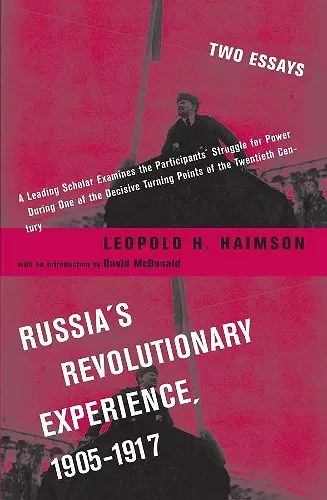Russia's Revolutionary Experience, 1905-1917
Two Essays
Leopold Haimson author David MacDonald editor
Format:Hardback
Publisher:Columbia University Press
Published:3rd May '05
Should be back in stock very soon

he eminent historian Leopold Haimson examines the nature of political power in Russia during the years leading to the Bolshevik revolution. The book explores the issue of power as it was reflected in struggles of Russian workers to control their own lives and in the outlooks and strategies of leading political figures on the objectives of the revolution and the ways to achieve them.
The assertion of a working-class movement, the brutal suppression of a miners' strike, a collapsing Duma, and shrewd political maneuverings all led to the Bolshevik revolution and the fall of Imperial Russia. The eminent historian Leopold Haimson examines these radical shifts in political power and class identity in late Imperial Russia, offering new perspectives on crucial revolutionary figures and the events leading up to the Russian Revolution. The book focuses on two pivotal, interrelated developments: the last massive wave of labor unrest before World War I and the growing differences between two political figures, Lenin, the future head of the Soviet Union, and Iulii Martov, the leader of the democratic opposition to Bolshevism within Russian Social Democracy. Inspired by the 1912 massacre of two hundred striking miners in the gold fields of Lena, in eastern Siberia, the Russian working class crystallized as a self-aware and politically engaged movement in pursuit of its own rights and dignity. This new sense of class solidarity spread to industrial urban workers, who asserted their demands for better working conditions and became increasingly skeptical of outside groups using them for their own political gain. As Haimson demonstrates, both the Duma (Russia's parliament) and the revolutionary intelligentsia struggled to find an appropriate response to these developments. Drawing on publications and the private papers of Martov and Lenin, Haimson analyzes the differences between the revolutionaries regarding the realization of political goals and the role of the working class. He demonstrates how ideology and personal proclivities framed their actions as the revolutionary tide mounted. Thus, while Martov believed that the revolution should be allowed to create itself under the democratic guidance and leadership of workers, Lenin saw the state and political power as the key to historical transformation.
Outstanding... highly recommended. -- N. M. Brooks Choice: Current Reviews for Academic Libraries An elegant and stimulating book that all concerned with the period will wish to read. -- Christopher Read, University of Warwick, United Kingdom Slavic Review
ISBN: 9780231132824
Dimensions: unknown
Weight: unknown
304 pages